Tennis in Indonesia stuck on the baseline
- Published
Action is needed to give tennis in Indonesia a bright future
For parents of young tennis players trying to make the grade in Indonesia, a number of sacrifices are needed - from selling the family home, to taking your offspring out of school for home tuition.
Twelve-year-old twin sisters Fitriani Sabatini and Fitriana Sabrina are among the top ranked players in their age group when they appear in tournaments such as the New Armada event in Central Java.
The pair - affectionately known as Ani and Ana by their mother - have been taught at home for a year so they can concentrate on their tennis.
"It was difficult to get the permission to skip classes to go to tournaments," says their mother Yetti "Nur" Mastuti.
"Their teachers were not very understanding."
Home sold
Nur, and the youngsters' tennis coach father Nursalim sold the family home in Jakarta - and now live in rented accommodation - in order to pay tennis travel costs for the young pair.
At least once a month they compete in tournaments, some of them away from their home city.
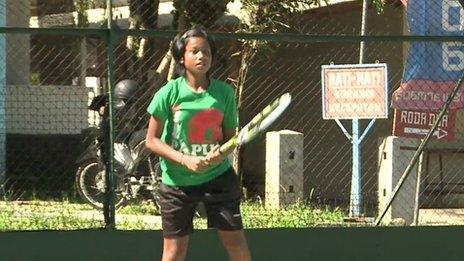
Ani Sabatini and her twin sister both have tennis career aspirations
The youngsters hope to emulate the Williams sisters, Venus and Serena, who each went on to become the world's number one player.
When I ask who would achieve this feat first, Ani, the older of the two. quips with a big smile, "The big sister first, of course."
Indonesian hero
But it is a dream that is increasingly hard to achieve for Indonesian players.
Indonesia's economic growth is visible in the sprawling new apartments that dot the Jakarta skyline, and the modern buildings come with sporting facilities not previously available to many Indonesians.
Tennis courts are a common feature.
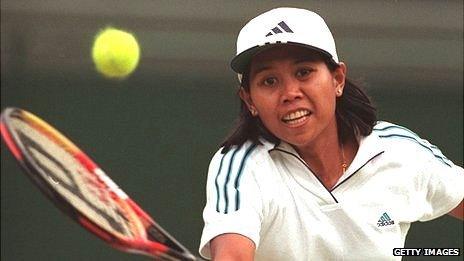
Yayuk Basuki was a successful player in the late 1990s
But the sport is not necessarily more popular today than a few years ago, when Indonesian tennis was a force to be reckoned with, at least regionally.
Yayuk Basuki was Indonesia's biggest tennis star, winning four Asian Games gold medals in the 1980s and 1990s.
She also reached the quarter finals of Wimbledon in 1997, the furthest any Indonesian has ever gone at a Grand Slam event.
Later that year she also become the highest-ever WTF ranked tennis player from Indonesia, reaching number 19.
Pay to play
Today she runs the Yayuk Basuki Tennis Academy, teaching more than 150 under-18-year-olds the fundamentals of the game.
She claims her school charges less than others in Jakarta, because she wants to give everyone a chance to play.
Yayuk's school has trouble finding affordable facilities to use. There are no free public tennis courts in Indonesia.
Even government facilities charge fees, and Yayuk says the fees go up every year.
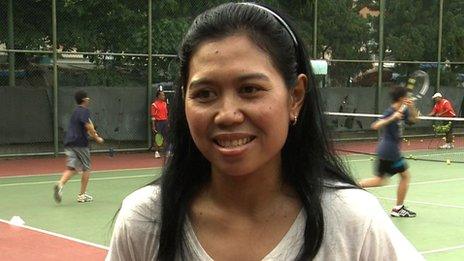
Yayuk Basuki would like other Indonesians to emulate her playing success
"We're not asking for free facilities," Yayuk said. "But if I can subsidise kids who are not wealthy enough to pay, why can't the government also subsidise if they have good facilities?"
The situation means tennis remains known as a sport for the wealthy in the country.
Most children who pick up tennis at a young age come from the upper middle class, who have access to a court at home, or whose family can afford to put them in a club.
However, the trouble for Indonesia is that the majority of the privileged children are not interested in pursuing tennis in the way that twins Ana and Ani are.
Their drive saw the twins win the doubles at the the New Armada tournament, and in the singles Ani was the losing finalist, and Ana reached the semis.
'Build sport'
Private tennis instructor Alex Santoso sees a lot of potential in some of his students.
But he says those from richer families do not want to become professionals, as there is no guarantee they can "make a lot of money" by becoming a top-ranked male ATP or female WTA player.
And he claims that with the current competition and development programmes in Indonesia "it's impossible to get there".
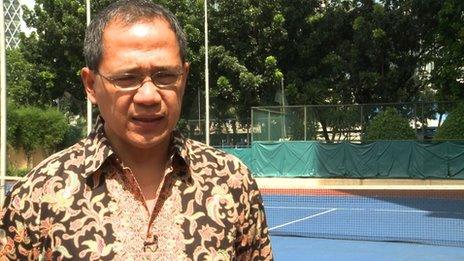
Maman Wirjawan is looking to build a solid tennis base across the country
The Indonesian Tennis Association, known as Pelti, is the governing body of tennis in the country.
Many Indonesians who are involved in tennis criticise Pelti for neglecting the development of young players, which has led to the talent drain in the last few years.
Its chairman Maman Wirjawan admits that there is a lot of work to be done, but refuses to take the blame.
"It's not only the government's job. The government has many problems as well. So we have to support the government. We have to help find ways to build sport in this country," he says.
Monthly tournaments
Since taking on the leadership of Pelti in 2012 he says he has been working on a sustainable programme to develop young talent.
"We start from junior [level] - we are now planning to have tournaments in many cities, especially big cities, [in] 10 to 15 cities throughout the nation," he explains. "We will hold it on a monthly basis for the next five years."
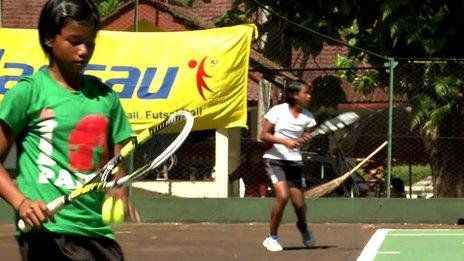
The new programme could mean more home-town events for the tennis twins
Wirjawan's programme can only succeed with corporate sponsorship.
But he is a brother of Indonesia's Trade Minister Gita Wirjawan, and has extensive experience in port and oil and gas businesses.
Many hope that his wide network can help secure the support tennis needs.
That will give much comfort to potential talents like twins Ani and Ana who will be able to play more matches in their home town and improve their skills.
But unless and until that happens, the sacrifices made by the twins and their family may be high-risk, and the outlook for Indonesian tennis remains bleak.